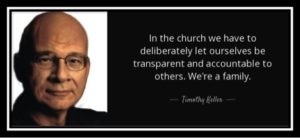Three Keys To Effective Volunteer Training
I don’t know about you, but I HATE playing games when there’s no clear scoreboard.
I’ll take it one step further: I hate playing games when there’s not a prize for the winner! (Yes, even “bragging rights” are prize enough for me!).
The other day, I took 6 kids to a nearby soccer field with a soccer ball (my two daughters and four of their friends). I thought it would be fun for them to kick the ball around.
Wrong.
- I didn’t split up teams.
- I didn’t establish the rules of the game.
- I didn’t make it compelling.
What happened instead?
- A seven-year old boy started whining because he was thirsty.
- A five-year old girl picked up the soccer ball and took off running.
- A 3-year old girl got bitten by a misquito and started crying.
#ParentFail
What’s true of kids is true of adults: they want a scoreboard.
Trust me when I say this: this is totally relevant to your volunteer development process.
PEOPLE WANT TO KNOW WHAT’S A WIN WHEN IT COMES TO THEIR INVOLVEMENT IN YOUR VOLUNTEER MINISTRY!
I love telling new volunteers this…
“I’ll always be grateful for your time and energy. But when volunteers like you ______________ (I fill in the blank with some of the best things volunteers have done), that’s when I brag about them to my wife.”
That, my friends, is a scoreboard. And people like scoreboards.
Keep that in mind as we talk through three vital keys to training new volunteers.
ONE: APPRECIATION
- Thank you.
**(Take some time to tell new recruits how grateful you are that they’re donating their time and energy to contribute to something that helps other people. Let them know how valuable volunteers are to the vision and mission of your church, and that you won’t take them for granted.)
TWO: MISSION
- What we do in this area of this church.
**(Explain what your department does. For instance, if you’re training technical volunteers for your main Sunday morning service, talk about what it takes to technically facilitate an excellent Sunday morning service from beginning to end.)
- Why we do what we do.
****(Explain the vision of your department. For instance, if you’re training volunteers in the nursery, you may talk about how you want to introduce babies to the love of Jesus. Or, you want parents to trust you with their babies so they can engage with Jesus in the worship service.)
- What their specific role will be.
**(Explain to volunteers exactly what they’ll be doing. Give details on when they need to arrive, what they need to wear, etc. Essentially, this is where you give them a one-paragraph job description for their volunteer role. You may want to print it out and hand it to them.)
- What’s the win?
**(This is your opportunity to let them know how to thrive in their role. The best way to do that is to think about current volunteers who are doing an awesome job. What are they doing? Why do you consider them great volunteers? With that information in mind, fill in the blank below and say something like, “When a volunteer in this area of our church does this:
_______________________________________________________
That’s when we know we’ve found an all-star! That’s when we have confidence that our volunteers are accelerating our ability to carry out the mission and vision.”
THREE: Protocol
- Relax. God changes lives. We can’t change people, and we shouldn’t try to control them. Instead of putting the weight of responsibility on your shoulders, ask the Holy Spirit to flow through you to point towards the transformational power of Jesus. Serving should be a joy, not a drain. So the best thing you can do is relax, smile, and enjoy the journey.
- Remember: When you choose to volunteer, you are agreeing to represent the authority and integrity of the church. With that in mind, you are now accountable to people who look to you as a leader in the church body. Demonstrate integrity in your words, relationships, actions, and social media accounts.
- Respect: We don’t take ourselves too seriously. At the same time, we do have a strong desire to do things with excellence. Because of that, we ask that you prepare for your role, show up on time, and work hard. Give us plenty of advance notice if something changes and you can’t make it.
- Recruit. As you serve here, we also want you to be on the lookout for other incredible people like you. Who do you know? Who do you hang out with? Start with those people. There is nothing more important to us than our volunteers. Since you will soon have the clearest and most realistic understanding of what it looks like to serve in this environment, you are most qualified to pinpoint new potential candidates. We need your help!
- Reveal. Through volunteering, we hope your love for (and trust in) the church grows. We will work as hard as we can to take good care of you. We are not, however, mind readers. Whether it’s a storm in your life or a frustration with our team, there’s a chance that we won’t know about it unless you tell us. As we strive to keep the lines of communication open with you, please do the same with us.
And again, thank you SO MUCH for your willingness to be a servant leader in our church!
Let’s be honest. Sunday morning is impossible without volunteers. None of us have the budget to hire staff positions for everything. But even if we did, we’d still want people to experience the joy of serving.
What Happens When You Serve is an easy-to-read book that helps you cast a bigger vision than fulfilling a role. In addition, this book is a GREAT way of expressing gratitude to your current servant leaders.
GET A PREVIEW OF THIS POWERFUL PRODUCT!
★★P.S. The What Happens When You Serve Sample Pack will give you a chance to pre-decide how to best position these booklets to be a win for your volunteer strategy!



